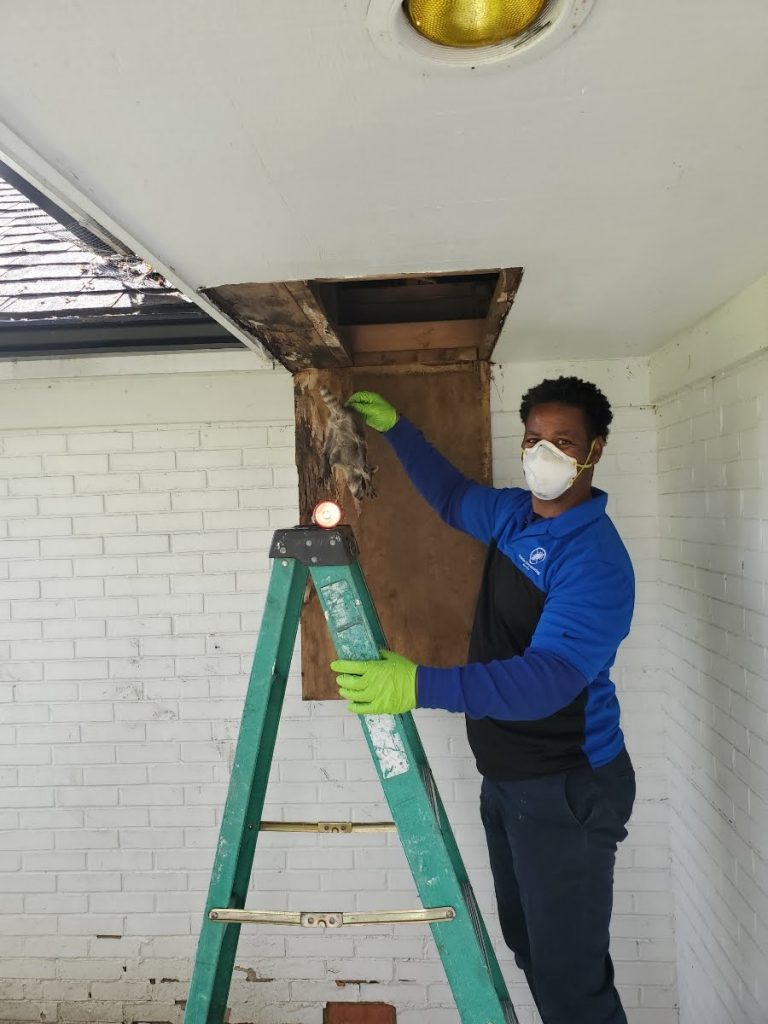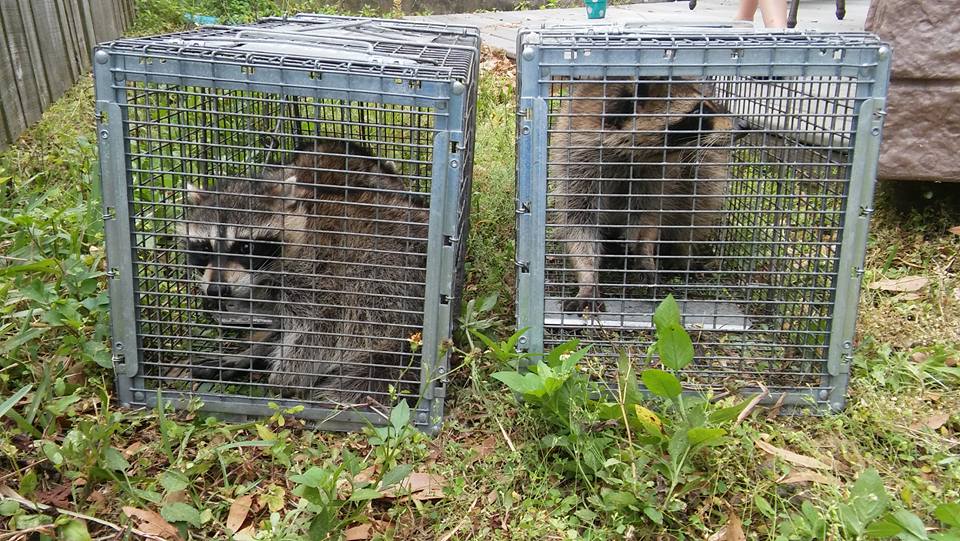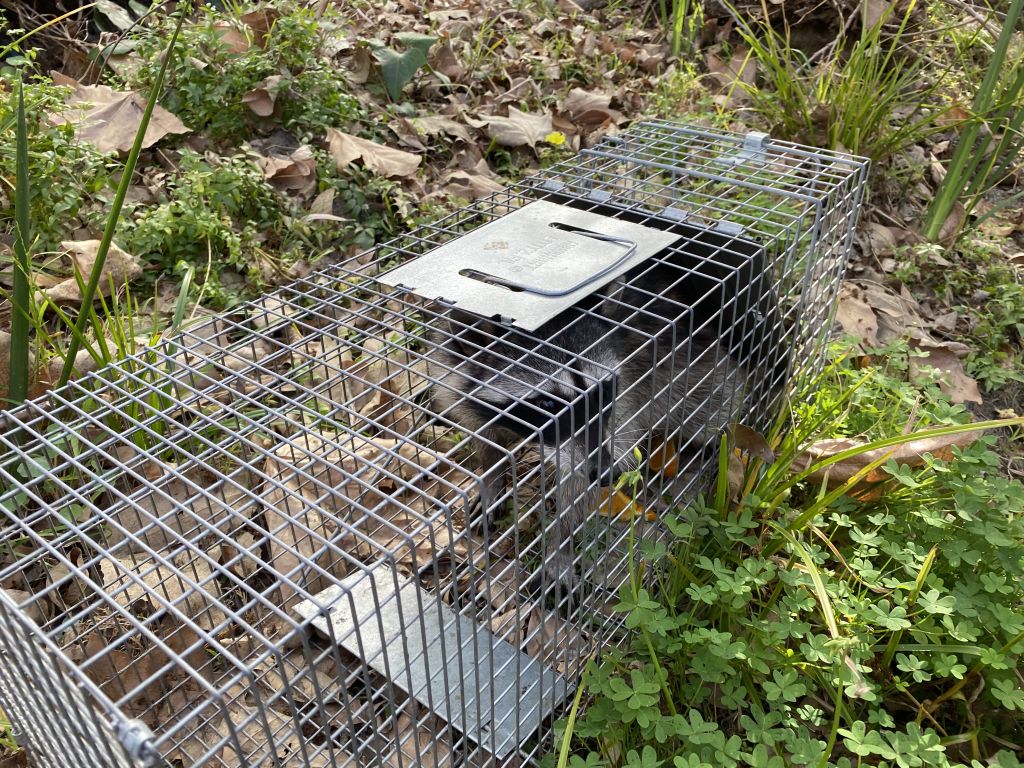As always, dealing with any form of wildlife can be extremely dangerous. Your first action must always be to contact a professional to help you deal with the problem. But unfortunately, this is not always possible, and sometimes you must handle the issue yourself. This can be extremely hard to pull off properly, so you must ensure to read as much as you can on the subject before attempting any type of trapping or removal yourself.
The following are step-by-step guides on removing raccoons from your house and/or surrounding areas.
RACCOONS IN YOUR HOUSE OR ATTIC
- Search through your entire house, both inside and out, to find any entrances the raccoons might be using to get inside. Most often the raccoons will be in your attic, but you must ensure there are no passageways or hiding spots hidden under your nose.
- Enter and inspect the attic. This can be extremely dangerous, so you must take appropriate precautions in case you run into an aggressive raccoon parent. Don’t expose skin, bring a flashlight, and preferably have someone else as a backup. You need to figure out whether or not there is a litter of babies living in your house already.
- If there are babies, you will need to set up a trap for the adult raccoon using a divider cage. Carefully read the instructions for your trap divider cage so you can fully understand how it works. Then very carefully place the babies in it, so you can trap the mother with them when she comes for them.
- Once they are trapped, you must take them as far away from your house as possible to prevent them from making their way back. You can bring them to some sort of animal preserve or shelter.
- Repair and fill in any holes you found that were used by the raccoons to enter your house. Clean up your attic thoroughly to remove all fur, leftovers, and feces. Spray the area with an enzyme cleaner. You must be as efficient as possible with the cleaning, as any leftovers can attract new raccoons, insects, and other animals, as well as cause house-damaging mold and dangerous diseases.

TRAPPING RACCOONS IN YOUR LAWN OR GARDEN

The general idea is the same as above, except you have to use a different type of trap, as well as hide it well for outside usage. You must also try to find other alternatives to trapping first, to save you any hassle in case the animal leaves on its own.
- Using repellents is much easier than trapping.
- Use the right type of trap and bait for each trap. Raccoons can vary in both size and intention towards your yard and house.
- Do not use meat as a trap. This will attract almost any other animal in the area, in addition to the raccoon. You don’t want to complicate the situation further.
The Damages Caused By Raccoons
Raccoons might look cute with their masked face, but they are one of the most destructive nuisance wildlife in the United States. With their sharp teeth and claws – coupled with their dexterity – they can wreak unimaginable havoc, both inside and outside buildings.
At Precise Exterminating Service Inc, one of our main specialties is raccoon removal and repairs. In this post, we explore some of the damages frequently caused by raccoons.
Let’s get right to it.
- Damage to your building exterior
When a raccoon wants to get into the house, it looks for vulnerable spots to break into. For instance, to get into the attic, a raccoon may break through the roof or shingles. And to gain access under the house, a raccoon will damage the siding of the porch or deck.
- Damage to the insulation
Once a raccoon gains access to the attic, its first mission is to build its nest. The raccoon does this by tearing off the insulation, wires and even bringing in foreign materials. Now, your insulation is important because it helps to maintain your home’s heating efficiency. With the insulation torn apart, you begin to waste energy, and your HVAC bill is sure to rise.
- Electrical Damage
As noted previously, a raccoon in the attic will also chew on wires, thereby exposing them. Exposed wires pose several risks. First off, exposed wires can form partial contact, which then damages household electrical appliances. Even worse, this partial contact can potentially start an electrical fire, which can ultimately be devastating.
- Damage to lawn
Although raccoons are omnivores, they have a particular love for grubs. And unfortunately, they are willing to destroy a lawn to get them. A damaged lawn disfigures your landscape, and it will cost you money to fix.

- Destruction to garden plants
As noted earlier, raccoons eat all kinds of plants and animals. This makes the garden the perfect place for them to satisfy their appetite. In the garden, they will feast on garden vegetables, melons, berries, grapes, and other fruits.
But that’s not all. They’ll also dig up the soil in search of grubs and larvae. This can negatively impact the roots of crops.
- Animal waste deposition and reduced air pollution
Raccoons usually have their latrine close to where they reside. With time, the deposited droppings begin to accumulate. Because their feces are mixed in urine, it has a very strong smell like ammonia as well as rotting feces.
If their feces accumulate in your attic, chimney, or under your house, it’s only a matter of time before the appalling smell makes your living space unbreathable.
- Risk of diseases
Aside from the damage they cause, raccoons also pose several health risks to humans and pets. Examples include rabies, canine distemper, infectious canine hepatitis, leptospirosis, and lots more.
Many of these diseases can be transferred either by a raccoon bite or scratch or by coming in contact with their feces.
That’s why it’s never a good idea to come in direct contact with raccoons or their feces. Instead, it’s best to involve professionals like Precise Exterminating Service Inc.
- Pollution from trash cans
With their dexterous hands, raccoons are notorious for meddling with trash cans. They will try to open it so they can access the free leftovers. However, during this process, they toss the can on the floor, causing all the garbage to spill out onto your property. This, in turn, pollutes your yard.
Wrap Up
Raccoons cause severe damages to properties – especially if they’ve resided there for too long. To end a raccoon infestation, you not only need to make the necessary repairs, but you also have to put an effective preventive strategy in place.
At Precise Exterminating Service Inc, you can always count on us to deliver the best in raccoon removal and repairs.
